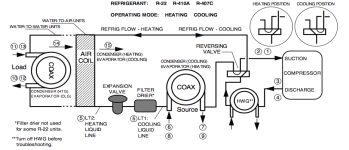walker450
Platinum Member
There was some discussion on geothermal heat pump systems in the "Propane Cost" thread... to avoid derailing that thread I decided to start a new one.
We are building a new home this summer and I plan on using a geothermal heat pump system so this topic is of much interest.
Here are some comments from the propane thread:
Sooooooo... please elaborate techman. I had the same understanding as buckeyefarmer: In the summer, hot water is basically "free", because that heat would have been rejected to the ground loop. In the winter, it is not "free", but is still available, because the heat's first purpose is to heat the air inside the home.
I am confused on the 70+ degree differential you describe. Can you elaborate? I'm just not seeing the difference between seasons on a geothermal unit.
Is the desuperheater between the compressor and reversing valve?
We are building a new home this summer and I plan on using a geothermal heat pump system so this topic is of much interest.
Here are some comments from the propane thread:
and also an electric hot water heater (in summer, hot water is free as part of the geothermal cooling cycle).
Actually you make much more hot water in the winter than in the summer. The hot water generator, known as a desuperheater, removes the "heat of compression" from the freon and transfers it to the hot water loop. In the summer, since the ground water loops are close in temperature to the temperature of the evaporator coil (for AC) there is low pressure and not much compression and therefore not much heat of compression. When heating, the temperature difference between the ground water loop and the heating coil (same coil as AC but a condenser when heating) is typically 70+ degrees. This will result in much higher freon pressures, and thus high compression of the freon. This generates a high freon temperature at the compressor discharge ("heat of compression"), which is removed and used to heat hot water. So this yields much more hot water generation during heating season.
paul
Geothermal desuperheater generates more HOT water in summer, not winter. In the summer when you are taking heat out of your house, you have free heat to use to make hot water, before dumping the heat into the ground. In the winter, you want all the heat you can get to heat your house, it only heats water if it's not supplying heat to your house.
Sooooooo... please elaborate techman. I had the same understanding as buckeyefarmer: In the summer, hot water is basically "free", because that heat would have been rejected to the ground loop. In the winter, it is not "free", but is still available, because the heat's first purpose is to heat the air inside the home.
I am confused on the 70+ degree differential you describe. Can you elaborate? I'm just not seeing the difference between seasons on a geothermal unit.
Is the desuperheater between the compressor and reversing valve?
